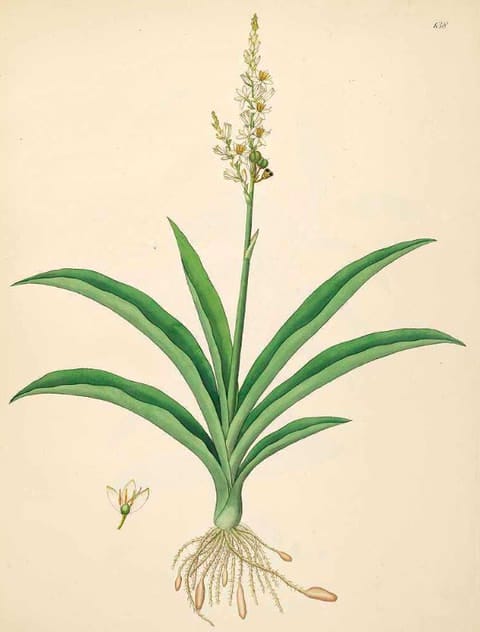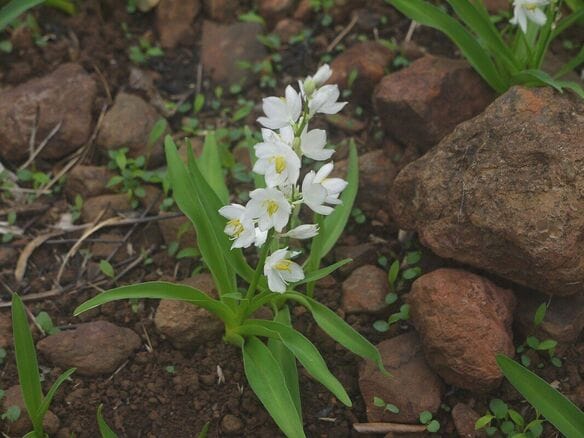Chlorophytum, Musali
Shveta Musali (Ayurveda)Safed Musali (Unani)
Vallai Musali (Siddha)
Tibbati Ginseng (Folk)
 A. tuberosum
A. tuberosumRoxburgh, W., Plants of the coast of Coromandel, vol. 2 (1798)
 Chlorophytum tuberosum
Chlorophytum tuberosum(Photo by Dinesh Valke) (Wikimedia)
Botanical name:
Chlorophytum spp.
- C. arundinaceum (official species)
- C. borivillianum
- C. tuberosum
- C. indicum (syn. C. attenuatum)
Parts used:
Root
Temperature & Taste:
Cool, moist. Sweet
Uses:
1. Strengthens Kidneys, Nourishes Yin:
-tonic for women, strengthening and beautifying them, increasing Fertility
-increases Semen
-regarded as a thickener of Semen, to prevent Premature Ejaculation
-Diabetes
-Leukorrhea, Spermatorrhea
2. Strengthens the Bones and Joints:
-chronic Arthritic disease, Rheumatism
-Lower Back pain
Dose:
Powder: 3–5 grams
Substitute:
1. Asparagus adscendens
2. Chlorophytum is itself used as a substitute for Orchis (Satyrion).
Main Combinations:
Often used with Curculigo root in Ayurveda; these two being called Black and White Musali.
1. Leukorrhea, Urinary disorders with Weakness Chlorophytum with Tribulus seed, Tragacanth, Quince seed, Talcum (Ayurveda)
2. Leukorrhea, Chlorophytum with Asparagus root, Curculigo, Withania (Ayurveda)
3. Spermatorrhea, Premature Ejaculation, and to make Strong, Chlorophytum with Withania, Pueraria tuberosa, Pyrethrum, Orchis
4. Rheumatism:
i. Chlorophytum with Tumeric
ii. and to increase Immunity, Chlorophytum with Eulophia ochreata
5. Arthralgia, Back pain, Wind-Damp diseases, Chlorophytum with Withania, Asparagus root, Ginger, Long Pepper (as in Pills of Withania)
6. Aphrodisiac:
i. Chlorophytum with Curculigo
ii. Chlorophytum with Mucuna, Emblic Myrobalan, Salmalia root
iii. Chlorophytum with Pistcahio, Almond, Walnut, Orchis, Asparagus root, Withania, Asparagus root, Mastic, Saffron
iv. Chlorophytum with Basil seed, Tribulus, Mucuna
7. Female tonic:
i. female sexual debility, Chlorophytum with Poppy seed, Mucuna, Asparagus root, Mastic (Ayurveda)
ii. Chlorophytum with Asparagus root, Pueraria, Tribulus seed, Sida cordifolia, Cinnamon, Tabasheer, Calamus, Licorice, White Sandalwood, Cyperus rotundus. A tonic for women, strengthening and beautifying them.
iii. Chlorophytum with Catechu, Withania, Cumin, Cinnamon, Plumbago, Iron Bhasma, Red Coral
8. Anemia, Fatigue, Chlorophytum with Eulophia ochreata, Sterculia urens, taken with milk.
9. Diabetes, Chlorophytum with Curculigo root (equal parts, Ayurveda)
10. Nervous disorders, Epilepsy, Syncope, Emaciation, Mania Chlorophytum with Withania, Madder, Chebulic Myrobalan, Licorice, Cyperus rotundus, Calamus (as in Withania Wine, Ashwagandha Arista)
11. Syphilis, Chlorophytum with Cinnabar
Major Formulas:
Pills of Withania
Cautions:
None noted
Main Preparations used:
-
Extra Info
- Research
–Free radical scavenging potential of Chlorophytum tuberosum Baker.
STRESS
–Effects of Chlorophytum arundinaceum, Asparagus adscendens and Asparagus racemosus on pro-inflammatory cytokine and corticosterone levels produced by stress.
EFFECT ON SPERM
–An evidence-based approach to medicinal plants for the treatment of sperm abnormalities in traditional Persian medicine.
–Clinical evaluation of root tubers of Shweta Musali (Chlorophytum borivilianum L.) and its effect on semen and testosterone.
INCREASES TESTOSTERONE
–Clinical evaluation of root tubers of Shweta Musali (Chlorophytum borivilianum L.) and its effect on semen and testosterone.
